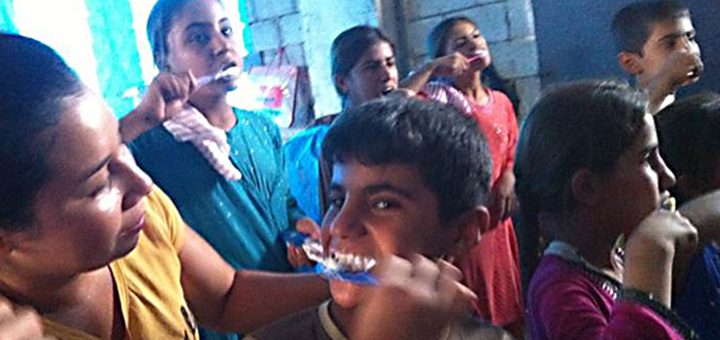The recent media reports filled with details of the atrocities carried out by ISIS were more than just news for me. As I watched the images from ISIS’s rampage through Iraq, my mind went to all the Iraqi religious minorities living in my hometown of Lincoln, Nebraska, the capital of the Yazidi diaspora in America.
In the past three years I have become friends with many Yazidis and Shi’a Muslim Iraqis in my work at the Good Neighbor Community Center. The people I saw on my screen looked like my friends and their relatives. My heart was touched, and I called one of my best friends from the center, Jamal, a Yazidi lawyer from the Sinjar region of Iraq who was a translator for the U.S. Army before immigrating to start a new life in this country.
When I asked how he was doing, Jamal told me he had dropped out of his English classes and was spending most of his time at home. He wasn’t able to concentrate on his classwork because his thoughts wandered to his homeland and the events transpiring there. He said that his immediate family had escaped, but two of his uncles were missing along with one of his best friends. He also said that every one of the 200 Yazidi families in Lincoln had lost someone. Their sadness is compounded by the fact that through this unfathomable tragedy the Yazidis are losing their homeland that they have inhabited for thousands of years.
A Closer View
A few days later my friend Conrad Vine, president of Adventist Frontier Missions, asked if I would accompany him on a trip to Arbil (in Kurdistan in the north of Iraq) to explore the possibilities of AFM launching a humanitarian project with some of the 1.8 million refugees in Iraq. We flew to Arbil a day and a half after he called.
 The trip was emotionally overwhelming. Besides the reality that we were near a war zone and there was a risk of car bombs or kidnapping (Arbil is only 50 miles from Mosul, the biblical Nineveh, which is controlled by ISIS) we witnessed tens of thousands of displaced people seeking shelter in vacant lots, abandoned buildings, schools, church/mosque yards, and even in the streets. We listened to their stories of how ISIS chased them from their homes, patting them down on their way out so they escaped with only the clothes on their backs. However, they all felt fortunate to be alive—many of their neighbors, friends and relatives were not so lucky.
The trip was emotionally overwhelming. Besides the reality that we were near a war zone and there was a risk of car bombs or kidnapping (Arbil is only 50 miles from Mosul, the biblical Nineveh, which is controlled by ISIS) we witnessed tens of thousands of displaced people seeking shelter in vacant lots, abandoned buildings, schools, church/mosque yards, and even in the streets. We listened to their stories of how ISIS chased them from their homes, patting them down on their way out so they escaped with only the clothes on their backs. However, they all felt fortunate to be alive—many of their neighbors, friends and relatives were not so lucky.
We met five of the 10 Adventists in Kurdistan. In all of Iraq, with a population of over 33 million people, there are only 30 Seventh-day Adventists. We also met with United Nations officials and officials of other humanitarian organizations. AFM had already raised some funds, and we were able to arrange installation of a second row of toilets, showers and kitchen facilities that would serve 1,500 people in a mini-camp in Arbil.
Long-term Opportunities
I returned home with a great desire to see God’s people show His love for those who have been deprived of almost everything in this life. At this point, AFM is planning a long-term project there since the vast majority of refugees will end up living in the camps for a decade or more. Most refugees we spoke with said they had lost faith in their former neighbors and could never again feel safe in their former homes.
AFM is currently laying plans to invite two local families, one Kurdish speaking and one Arabic speaking, to begin meeting the physical needs of these displaced people and, most importantly, offering them the greatest gift of all—hope for eternal life.
[hr]
How you can help
Since this will be a long-term project, monthly donations to the Refugee Ministry are the best way to help.
[hr]
This article, also published in the December 2014 print edition of OUTLOOK, was written by Doug Hardt, director for the Union College Center for Interfaith Studies and Culture and outreach coordinator for the Good Neighbor Community Center in Lincoln, Nebraska. He served for eight years as a missionary in the former Soviet Union and the Middle East.










